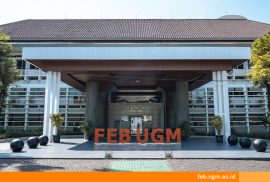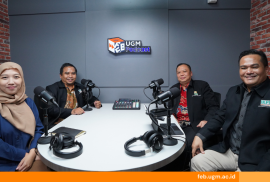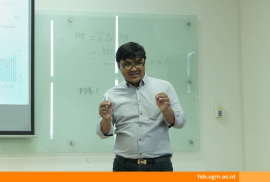The world of philanthropy in Indonesia holds the key in a social context. In this case, Indonesia’s political, social, and economic constellation has made Muhammadiyah have a wide range of capital for mobilization in the form of zakat, infaq, waqf, and alms. The practice of philanthropic zakat in Indonesia itself only started in the 90s. Previously, the Muslim community carried out conventional zakat, infaq, waqf, and alms, namely by giving to people around who need it without going through an accredited institution.
To explore more deeply about this matter, the Faculty of Economics and Business UGM held a webinar with Lazismu PP Muhammadiyah on the topic “The Role of Islamic Philanthropy in Building the Nation’s Economy.” This event was held on Wednesday (13/04) through zoom meetings. Webinar participants are intended for lecturers, researchers, practitioners, and the general public. This event was hosted by Diyah Putriani, S.E., M.Ec., Ph.D. a lecturer at the Department of Economics, Faculty of Economics and Business UGM.
The webinar was filled with two great speakers in their fields. The first speaker was Andar Nubowo, DEA as the Governing Body for the Distribution and Utilization of the Central Lazismu. Andar explained that Lazismu has the vision to become a trusted, accountable, and transparent Amil Zakat Institution so it needed to implement a modern approach. Lazismu has made basic movements to create a just and prosperous country that is by the word of God. Lazismu has moved to serve in many countries besides Indonesia, namely Australia, Singapore, India, Palestine, England, and many more.
Andar also explained that there were several concrete actions taken by Lazismu to improve the Indonesian economy. The action was in the form of building the Said Tuhuleley Floating Clinic for the people of Maluku to provide health services. In addition, Lazismu also distributes zakat to eastern Indonesia where only 3% of the Muslim population is present, indicating that Lazismu also helps people of other religions. There is also a Ziska Bank (Zakat, Infaq, Alms, Waqf) in East Java to manage zakat funds professionally like a bank.
Meanwhile, the second speaker at this webinar is Prof. Mahfud Sholihin, M.Acc., Ph.D. a Professor of Accounting at Faculty of Economics and Business UGM, Chair of DSAS IAI, and Chair of Entropy Researcher UGM LPDP Grant. Professor Mahfud emphasized that we as Muslims should do waqf, zakat, infaq, and alms using the best assets we have. Therefore, he developed the applications of Taman Ziswaf (Zakat, Infaq, Alms, and Waqf) and Sawut (Cash Waqf Accounting System) aimed at mapping community business development. Sawut himself was created based on the issue at the Islamic Philanthropy Institute in collecting public funds, namely about low transparency and accountability.
Professor Mahfud also explained data on the accumulation of cash waqf which increased significantly in 2008-2020, from 1.9 million in 2008, tomore than 600 million in 2020. In addition, the number of wakif also increases every year. In 2008, only 9wakif donated money, while in 2020 it increased to 1,870 people. In 2021, the total funds raised was 414.79 billion. Meanwhile, the total disbursed funds amounted to 342.79 billion.
Reportage: Merisa Anggraini




